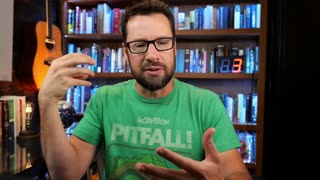Episode 1423: Obstacles and Opportunities of Faith
You know there is a troubling pattern today and its not wokness even thought that is a problem all in and of itself and I will have an episode on that matter. What I am talking about is the problem of Ignorance!
Lets define ignorance in order to take the sting out of that word.
The word "ignorant" comes from the Latin word "ignorantia," which means "lack of knowledge" or "not knowing." It is derived from the verb "ignorare," which means "to not know" or "to be unaware." In short it means the lack of understanding or knowledge about a particular subject or topic. The concept of ignorance has been discussed and explored throughout history in various philosophical, educational, and cultural contexts.
It seems today people who have absolutely know understanding on a subject matter will dive right in and start spewing their thoughts. This is troubling because at its basis it is not based on and knowledge and therefore they need to create a word to step all over this learning process to gain knowledge and that is “Well that is my truth”. Well sadly there is no truth in ignorance but rather a false tongue and ignorant tongue.
If we want to grow in our faith we need to learn our faith and we need to stop talking and do more reading and listening.
What have the great saints of the Catholic Church said about Ignorance.
Saint Augustine (354-430):
Saint Augustine, one of the most influential theologians He famously wrote in his work "Confessions":
"You have made us for Yourself, O Lord, and our hearts are restless until they rest in You." Augustine's writings often discuss the journey from spiritual ignorance to knowledge and understanding of God.
St Thomas Aquinas's teachings regarding ignorance of the faith:
Necessity of Knowledge: Aquinas emphasized the importance of knowledge and understanding in matters of faith. He believed that knowledge of God and His teachings was essential for salvation. He wrote that "lack of knowledge does not excuse" in matters of faith, meaning that being ignorant of essential truths could still have moral consequences.
Invincible Ignorance: Aquinas distinguished between different types of ignorance. He introduced the concept of "invincible ignorance," which refers to ignorance that a person could not reasonably be expected to overcome due to circumstances such as lack of access to information or intellectual limitations. In cases of invincible ignorance, Aquinas believed that God's justice would take such factors into account.
Vincible Ignorance: On the other hand, Aquinas discussed "vincible ignorance," which is ignorance that a person should be able to overcome through reasonable effort. He argued that individuals are morally responsible for overcoming vincible ignorance, especially when it comes to essential matters of faith and morality.
Responsibility and Moral Consequences: Aquinas believed that deliberate ignorance, where a person purposefully avoids seeking knowledge, is blameworthy. He saw it as a form of negligence that could lead to moral culpability. Ignorance, in this sense, could exacerbate the moral implications of sinful actions.
Role of Reason and Revelation: Aquinas sought to reconcile faith and reason, believing that human intellect and rationality were gifts from God. He acknowledged the importance of human reason in understanding and defending the truths of the faith. He saw faith as complementing reason, providing insights that transcended the limits of human understanding.
Education and Instruction: Aquinas highlighted the role of education and instruction in overcoming ignorance. He recognized the importance of spreading knowledge of the faith through teaching and preaching, as well as engaging in thoughtful dialogue to address misunderstandings and doubts.
In summary, St. Thomas Aquinas emphasized the significance of knowledge and understanding in matters of faith. He acknowledged different types of ignorance, considering factors that might mitigate moral responsibility for ignorance, while also stressing the importance of seeking knowledge and overcoming ignorance through reasonable effort. His teachings provide insights into the moral and intellectual dimensions of ignorance within the context of faith and spirituality.
So your are probably asking why are you focusing on ignorance in an episode titled obstacles and opportunities of the faith.
If you ever wanted to get to higher level whether a good teacher or accountant or doctor what do you do? You seek a higher education and you learn. Once you learn you practice right? But you couldn’t practice with out having a foundation of understanding gained by learning. So when people say my truth that is akin to someone without a higher education insist they know as much about teaching when they have no education or experience in that field. That is why when we were in college many fo our friends would say things like oh you think a college degree makes you smarter than me. No we thought a college degree was the basis for getting to the next level of ? practicing something that was above those that didn’t. Does it make us arrogant. No! As a matter of fact when I first practiced I was called ignorant. I was. Why because I hadn’t yet practiced.
So in order to become stronger in our faith we must first know our faith and study our faith and then practice our faith. In this way we will create great opportunities in stead of obstacle. I am amazed at those with higher learning that treat the secular so much more important than the spiritual. If we learn and practice then we are called to teach. So if people say you should never talk about faith or politics they couldn’t be further from the truth. In order to grow in understanding is to do just that.
Now I will turn this subject over to the much learned Fr. Geraci
-
 47:22
47:22
CatholicReboot
3 months ago $0.09 earnedEpisode 1971: Embracing Faith in the Face of Turmoil
117 -
 49:19
49:19
CatholicReboot
3 months ago $0.01 earnedEpisode 2063: Embracing Faith, Hope, and Redemption
105 -
 1:33:43
1:33:43
HandinHandwithGodTv
1 year ago20 Questions with Pastor Mike (Episode 87)
82 -
 1:45:57
1:45:57
HandinHandwithGodTv
1 year ago20 Questions with Pastor Mike (Episode 103)
97 -
 23:30
23:30
Christian Writings
1 year agoLesson 5 What Are The Obstacles To Saving Faith? By Jean Gibson
6 -
 17:28
17:28
CompanionChapel
3 months ago#ACTS Ch 27 'THE ONLY WAY TO REINFORCE FAITH IS THROUGH AFFLICTION' Episode#536
121 -
 1:56:25
1:56:25
HandinHandwithGodTv
11 months ago20 Questions with Pastor Mike (Episode 104)
96 -
 2:10:05
2:10:05
HandinHandwithGodTv
1 year ago20 Questions with Pastor Mike (Episode 97)
85 -
 2:04:12
2:04:12
HandinHandwithGodTv
1 year ago20 Questions with Pastor Mike (Episode 102)
63 -
 1:56:04
1:56:04
HandinHandwithGodTv
1 year ago20 Questions with Pastor Mike (Episode 95)
102